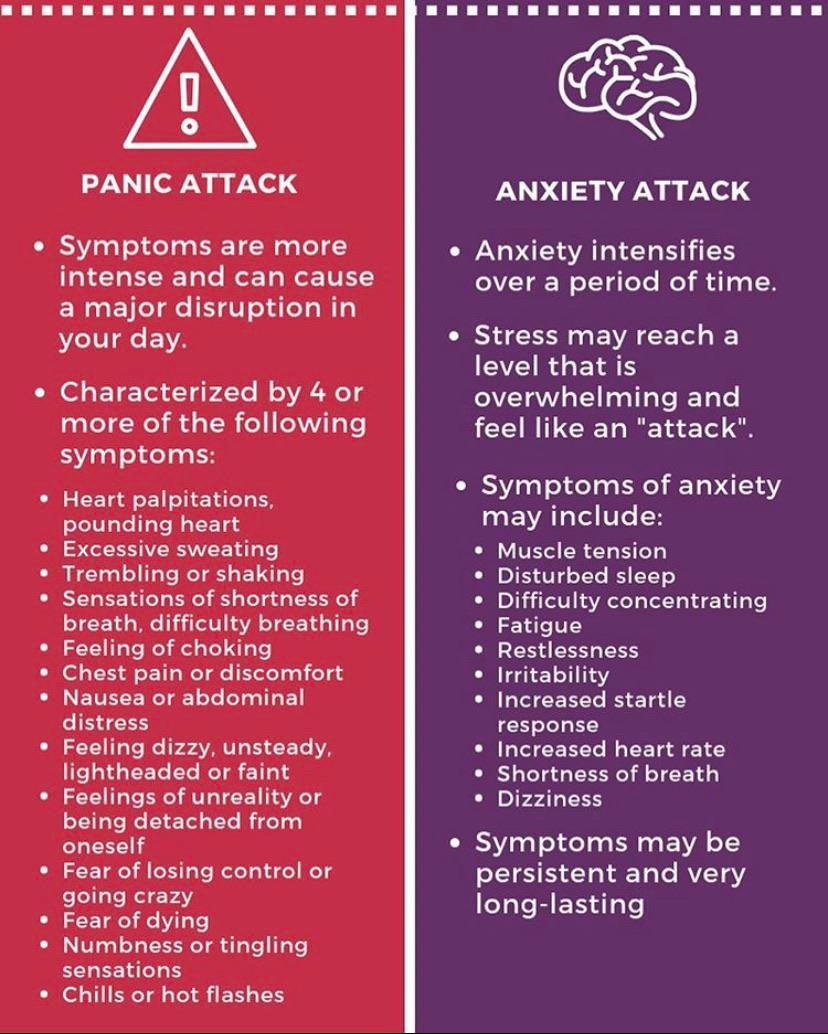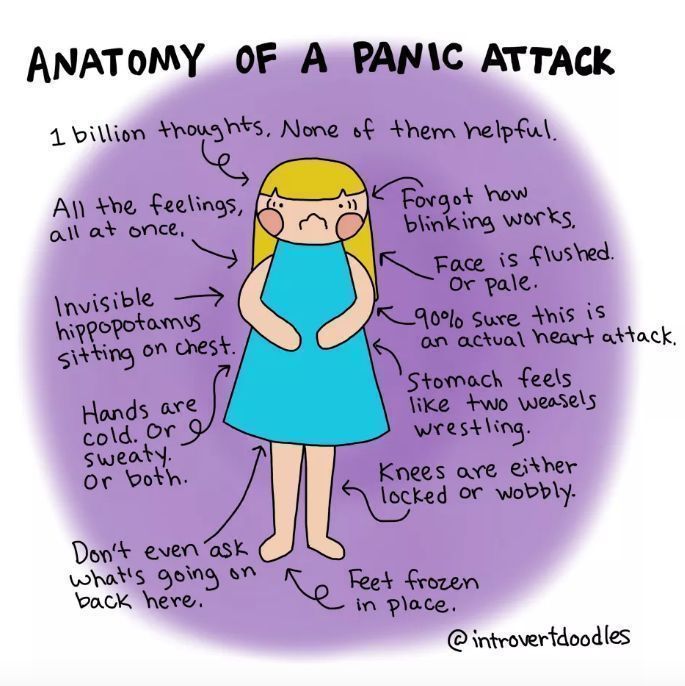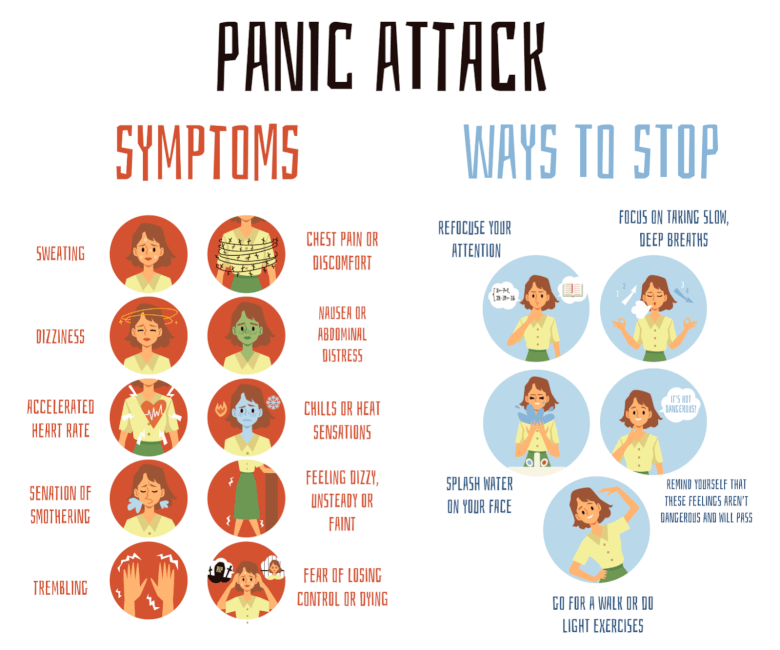Recovery Is Possible With Treatment
Recovery from an anxiety disorder is possible with the right treatment and support. Effective treatments for anxiety disorders may include:
- Cognitive behavioural therapy aims to change patterns of thinking, beliefs and behaviours that may trigger anxiety.
- Exposure therapy involves gradually exposing a person to situations that trigger anxiety using a fear hierarchy: this is called systematic desensitisation.
- Anxiety management and relaxation techniques for example deep muscle relaxation, meditation, breathing exercises and counselling.
- Medication this may include antidepressants and benzodiazepines.
Symptoms Of Anxiety Disorders
The main features of an anxiety disorder are fears or thoughts that are chronic and distressing and that interfere with daily living. Other symptoms of an anxiety disorder may include:
- Panic or anxiety attacks or a fear of these attacks.
- Physical anxiety reactions for example trembling, sweating, faintness, rapid heartbeat, difficulties breathing or nausea.
- Avoidance behaviour a person may go to extreme lengths to avoid a situation that they think could bring on anxiety or panic.
Panic Attack Or Anxiety Attack How To Tell The Difference
Youre driving home after an uneventful day at work. You dont have much on your agenda for the evening just a nice, quiet dinner at home. Overall, it has been a day of very limited stress or disturbance.
Then, out of nowhere, discomforting feelings begin to overwhelm you. You dont know where the feelings are coming from or how to suppress them and, it seems theyre only intensifying by the moment. The feelings become so consuming that you need to stop driving, so you pull your car over on the side of the road.
You wonder what could be going on and how this could have happened.
Are you experiencing a panic attack? Or, is it an anxiety attack?
What is a Panic Attack?
Panic attacks and anxiety attacks differ in various ways. Lets start by examining what a panic attack is.
In the situation mentioned above, its very likely the overwhelming feeling you were experiencing while driving was a panic attack. According to the Diagnostic and Statistical Manual of Mental Disorders , a panic attack is defined as an abrupt onset of fear or discomfort. Panic attacks, according to the DSM-5, include at least four of the following symptoms:
Palpitations, pounding heart or accelerated heart rate
Sweating
Sensations of shortness of breath or smothering
Feelings of choking
Feeling dizzy, unsteady, light-headed or faint
Chills or heat sensations
Feelings of unreality or feelings of being detached from oneself
Fear of losing control
Fear of dying
What is an Anxiety Attack?
Worry
Dizziness
Recommended Reading: What Do Eating Disorders Do
Panic Disorder: When Fear Overwhelms
Do you sometimes have sudden attacks of anxiety and overwhelming fear that last for several minutes? Maybe your heart pounds, you sweat, and you feel like you cant breathe or think clearly. Do these attacks occur at unpredictable times with no apparent trigger, causing you to worry about the possibility of having another one at any time?
An untreated panic disorder can affect your quality of life and lead to difficulties at work or school. The good news is panic disorder is treatable. Learn more about the symptoms of panic disorder and how to find help.
Things You Can Try Yourself

The next time you feel a panic attack coming on, try the following:
- do not fight the attack and stay where you are, if possible
- breathe slowly and deeply
- remind yourself that the attack will pass
- focus on positive, peaceful and relaxing images
- remember it is not life-threatening
To reduce the chances of a further attack, it may also help to:
- read a self-help book about how to control anxiety using CBT
- try other therapies such as massage and aromatherapy
- try activities like yoga and Pilates to help you relax
- learn breathing techniques to help ease symptoms
- do regular physical exercise to reduce stress and tension
- avoid sugary food and drinks, caffeine, alcohol and smoking as these can make attacks worse
Read Also: What Type Of Disorder Is Schizophrenia
Medication For Panic Attacks And Panic Disorder
Medication can be used to temporarily control or reduce some of the symptoms of panic disorder. However, it doesnt treat or resolve the problem. Medication can be useful in severe cases, but it should not be the only treatment pursued. Medication is most effective when combined with other treatments, such as therapy and lifestyle changes, that address the underlying causes of panic disorder.
Medications used may include:
Antidepressants. It takes several weeks before antidepressants begin to work, so you have to take them continuously, not just during a panic attack.
Benzodiazepines. These are anti-anxiety drugs that act very quickly . Taking them during a panic attack provides rapid relief of symptoms. However, benzodiazepines are highly addictive and have serious withdrawal symptoms, so they should be used with caution.
Why Do Panic Attacks Happen
As with anxiety, a panic attack is a result of your body going into fight mode. It’s your nervous system springing into action.
Adrenaline is transferred into your bloodstream putting your body on high alert. This quickens your heart rate, brings on heart palpitations and sends more blood to your muscles.
The result is fast, shallow breathing and your blood sugar increases.
Because of all this happens instantly, it can be terrifying, bring on extreme fear, and you feel out of control.
Theres ongoing research to determine whether panic attacks are also bought on by an imbalance of serotonin levels. Serotonin is the hormone in our body that stablises our mood, wellbeing and happiness.
You May Like: What Is Schizophrenia Called Now
Risk Factors For Anxiety Disorder
Some things also make you more likely to develop an anxiety disorder. These are called risk factors. Some risk factors you canât change, but others you can.
Risk factors for anxiety disorders include:
- History of mental health disorder. Having another mental health disorder, like depression, raises your risk for anxiety disorder.
- Childhood sexual abuse. Emotional, physical, and sexual abuse or neglect during childhood is linked to anxiety disorders later in life.
- Trauma. Living through a traumatic event increases the risk of posttraumatic stress disorder , which can cause panic attacks.
- Negative life events. Stressful or negative life events, like losing a parent in early childhood, increase your risk for anxiety disorder.
- Severe illness or chronic health condition. Constant worry about your health or the health of a loved one, or caring for someone who is sick, can cause you to feel overwhelmed and anxious.
- Substance abuse. The use of alcohol and illegal drugs makes you more likely to get an anxiety disorder. Some people also use these substances to hide or ease anxiety symptoms.
- Being shy as a child. Shyness and withdrawal from unfamiliar people and places during childhood is linked to social anxiety in teens and adults.
- Low self-esteem. Negative perceptions about yourself may lead to social anxiety disorder.
Types Of Anxiety Disorders
Anxiety becomes a disorder when its irrational, excessive and when it interferes with a persons ability to function in daily life. Anxiety disorders include:
- Generalised anxiety disorder
- Social phobias fear of social situations
- Specific phobias for example a fear of open spaces or enclosed spaces
- Panic disorders frequent and debilitating panic attacks.
Read Also: Can Bipolar Disorder Cause Panic Attacks
Comorbidities With Panic Disorder
Until recently, the panic disorder was not distinguished from agoraphobia . As it stands in the current Diagnostic and Statistical Manual of Mental Disorders – 5 agoraphobia is one of the most common disorders to co-occur with panic disorder. Current estimates contend that just under 2% of teens and adults have agoraphobia . Often, people associate panic attacks or their panic disorder with certain places, people, or events and the fear of another attack occurring can lead to comorbid fears of the location or idea that there is no escape, which leads to extreme avoidance. Panic disorder can also occur simultaneously with other anxiety disorders, such as Generalized Anxiety Disorder and/or Social Anxiety Disorder , for example.
Depression also commonly co-occurs with panic disorder, with reports estimating comorbidity between 10-65% over one’s life. This comorbidity is more likely to develop at the same time that panic disorder is recognized and diagnosed, although roughly 30% of people have major depression before meeting criteria for panic disorder as well .
Symptoms Of Panic Attacks
The symptoms of Panic Disorder are clearly defined in the 5th edition of The Diagnostic and Statistical Manual of Mental Disorders.
- Recurrent unexpected panic attacks
- A panic attack is a sudden increase in severe fear or discomfort. This discomfort generally reaches its worst peak within a few minutes. During this time four of the following symptoms are experienced:
- Following at least one of these panic attacks, must experience either:
- Continued concern about future panic attacks or the consequences
- Significant change in behavior associated with the attack
- Symptoms cannot be caused by a substance or medication or be due to a medical disorder
You May Like: What Are Some Symptoms Of Ptsd
Anxiety Pills Decrease: Stateofmindboostingsupplementoilthatworks Whats Worse Anxiety Or Panic Attacks
Stress,anxiety,panicattacksandbewilderistoughtocopewith.
Thislast2yearshaveactuallybeenunbelievablyexhausting.Taskloss,cashconcerns,healthproblem,absenceofrest,foodratesandalsothefearofnotknowingwhatiscomingnext.
Nonetheless,itispossibletoalleviatethenegativeimpactstriggeredbystressandanxiety.Aswellasareafraidthatresultsinpanicattacks.
What To Do During An Anxiety Or Panic Attack

Periods of high anxiety and panic attacks can be overwhelming and chaotic, so people may react emotionally, rather than using rational judgment and previously learned techniques to address the symptoms. Because of this, people should carefully consider and practice the best possible coping skills to manage symptoms and control their responses.
Strategies that can help during a panic attack or anxiety attack are:3
Also Check: What Is The Phobia Of The Dark
Some People May Develop Panic Disorders
For many people, the feelings of panic occur only occasionally during periods of stress or illness. A person who experiences recurring panic attacks is said to have panic disorder, which is a type of anxiety disorder. They generally have recurring and unexpected panic attacks and persistent fears of repeated attacks.
Exactlyhowanointedsmiledrops Stress Panic Attacks Work Naturally
AnointedDropsmakerexplainsthatthisserviceconsistsoftheappropriateactiveingredientstoimproveyourmood,thereforealleviatingstressandalsoanxietyWhatsevenmore,Smileactiveingredientsgetsoakedupdirectlyintothebloodstreamhencebypassingthegastrointestinalsystemcompletely.
Furthermore,anointedSmiledropshaveapleasantflavorandalsopreference therefore,individualswillcertainlydiscoverthemsimpletoconsume.Lastly,theSmiledietarysupplementclaimsyourmoodswillgetliftedafterusingthisproductregularly.
You May Like: How To Live With A Depressed Spouse
How Can I Prevent Panic Attacks
Your healthcare provider can help you identify triggers that bring on panic attacks. During psychotherapy, you learn strategies to manage triggering events and prevent an attack. You can also take these actions to lower your odds of having a panic attack:
- Cut back on caffeine.
- Talk to your doctor before taking herbal supplements or over-the-counter medications. Certain substances can increase anxiety.
Where To Get Help
Overcoming anxiety and dealing with panic attacks is easier if you seek help. Talk to your doctor, , or see below for online programs and tools that can help.
- ReachOut.com’s ReachOut Worry Time App can help to control everyday worries and anxieties.
- Black Dog Institutes’ myCompass provides a personalised online self-help program.
- MindSpot’s Mood Mechanic Course helps young adults aged 18 to 25 and Indigenous Wellbeing Course is for Aboriginal and Torres Strait Islander adults aged 18 years and over.
- This Way Up’s online programs teach individuals core skills to tackle symptoms of panic and generalized anxiety disorder.
You May Like: How Do People Get Schizophrenia
Who Is At Risk For Anxiety Disorders
The risk factors for the different types of anxiety disorders can vary. For example, GAD and phobias are more common in women, but social anxiety affects men and women equally. There are some general risk factors for all types of anxiety disorders, including
- Certain personality traits, such as being shy or withdrawn when you are in new situations or meeting new people
- Traumatic events in early childhood or adulthood
- Family history of anxiety or other mental disorders
- Some physical health conditions, such as thyroid problems or arrhythmia
Are You Having An Anxiety Attack Or A Heart Attack
People who suffer from panic attacks often say their acute anxiety feels like a heart attack, as many of the symptoms can seem the same. Both conditions can be accompanied by shortness of breath, tightness in the chest, sweating, a pounding heartbeat, dizziness, and even physical weakness or temporary paralysis.
Perhaps most powerful, though, is the sense of dread that overshadows both events. The fear itself can lead to an increase in these symptoms.
You May Like: What Are Eating Disorders Caused By
How Can I Learn More About Anxiety
These organizations offer information about and resources for anxiety disorders:
Anxiety Disorders Association of America
This nonprofit organization is dedicated to advocacy and education about anxiety disorders. This link will take you to its website:
American Psychological Association
Get information on anxiety and help finding a psychologist. This link will take you to its website:
American Psychiatric Association
Learn more about childrenâs anxiety disorders and other mental health problems. Get help in finding a psychiatrist. This link will take you to the website:
National Alliance on Mental Illness
Learn more about panic disorder, phobias, and treatment that helps. This link will take you to the website:
Train Your Brain To Fight Anxiety

Research has shown that neurofeedback therapy might help in increasing alpha brainwave activity in individuals that have panic disorder. Alpha brainwave activity is linked to a reduction in stress, anxiety, discomfort, and pain.
Neurofeedback is a non-invasive methodology that measures brainwave activity and can train the brain using visual and auditory cues. Its based on a learning method called operant conditioning, which involves rewards and punishments for behavior.
Through operant conditioning, an association is made between a behavior and a consequence , with the goal of training the participants brain to regulate itself and help you understand when your brain is in the desired state. Eventually, your brain may be able to maintain a more balanced state even when it’s not receiving feedback.
In one study, researchers assigned participants with diagnosed panic disorder to a 7-week neurofeedback program to increase their range of alpha waves and relieve abnormal anxiety.
The study showed an increase in participants’ alpha brainwave activity. Also, scores on an anxiety questionnaire showed that the mental symptoms, physical symptoms, and fear were significantly lower.
These results are consistent with earlier findings showing that neurofeedback can relieve anxiety. Visit our research overview article for a comprehensive summary of neurofeedback research with supporting scientific references.
Also Check: How Much Cbd For Dog With Anxiety
Do I Have An Anxiety Disorder
If you identify with any of the following seven signs and symptoms, and they just wont go away, you may be suffering from an anxiety disorder:
Affordable Online Therapy
Nearly 3 Million people have turned to BetterHelp for professional online therapy. Take the quiz and get matched with a therapist that fits your needs.
- Shaking or trembling.
Because of these physical symptoms, anxiety sufferers often mistake their disorder for a medical illness. They may visit many doctors and make numerous trips to the hospital before their anxiety disorder is finally recognized.
The link between anxiety symptoms and depression
Many people with anxiety disorders also suffer from depression at some point. Anxiety and depression are believed to stem from the same biological vulnerability, which may explain why they so often go hand-in-hand. Since depression makes anxiety worse , its important to seek treatment for both conditions.
What Does Anxiety Chest Pain Feel Like
If, on the other hand, you experience chronic stress, suffered a recent traumatic event, or are having trouble coping with lifes ups and downs, you may be dealing with anxiety.
Symptoms of severe anxiety and panic often resemble a heart attack, which can worsen your distress. When anxiety feels like a heart attack, the panic can feel overwhelming. Luckily, when stressors go away, the symptoms usually do, too.
The effects of anxiety are different for everyone, and our response to anxiety can be situational. Here are some signs to look out for if you are experiencing anxiety chest pain symptoms:
- Persistent dull aching.
- Sharp, shooting, or stabbing pain.
- Tightness, tension, or pressure.
- Numbness in certain areas.
Don’t Miss: Is Ptsd A Permanent Disability
Can Anxiety Lead To Panic
A panic attack can be a symptom of anxiety.
A person who has panic disorder may experience anxiety that they are going to have a panic attack. The uncertainty about if, or when, an attack is going to happen may lead to worry or anxiety between attacks. People may take steps to avoid situations they feel will trigger a panic attack.
For a person with panic disorder, anxiety may trigger a panic attack. The fear of having a panic attack can affect a persons behavior and ability to function in daily life.
Johns Hopkins Medicine suggests there may be a genetic factor underlying panic disorder, as it usually runs in families.
What Causes Panic Disorder
Panic disorder sometimes runs in families, but no one knows for sure why some family members have it while others dont. Researchers have found that several parts of the brain and certain biological processes may play a crucial role in fear and anxiety. Some researchers think panic attacks are like false alarms where our bodys typical survival instincts are active either too often, too strongly, or some combination of the two. For example, someone with panic disorder might feel their heart pounding and assume theyre having a heart attack. This may lead to a vicious cycle, causing a person to experience panic attacks seemingly out of the blue, the central feature of panic disorder. Researchers are studying how the brain and body interact in people with panic disorder to create more specialized treatments. In addition, researchers are looking at the ways stress and environmental factors play a role in the disorder.
Read Also: Is Tms Approved For Bipolar